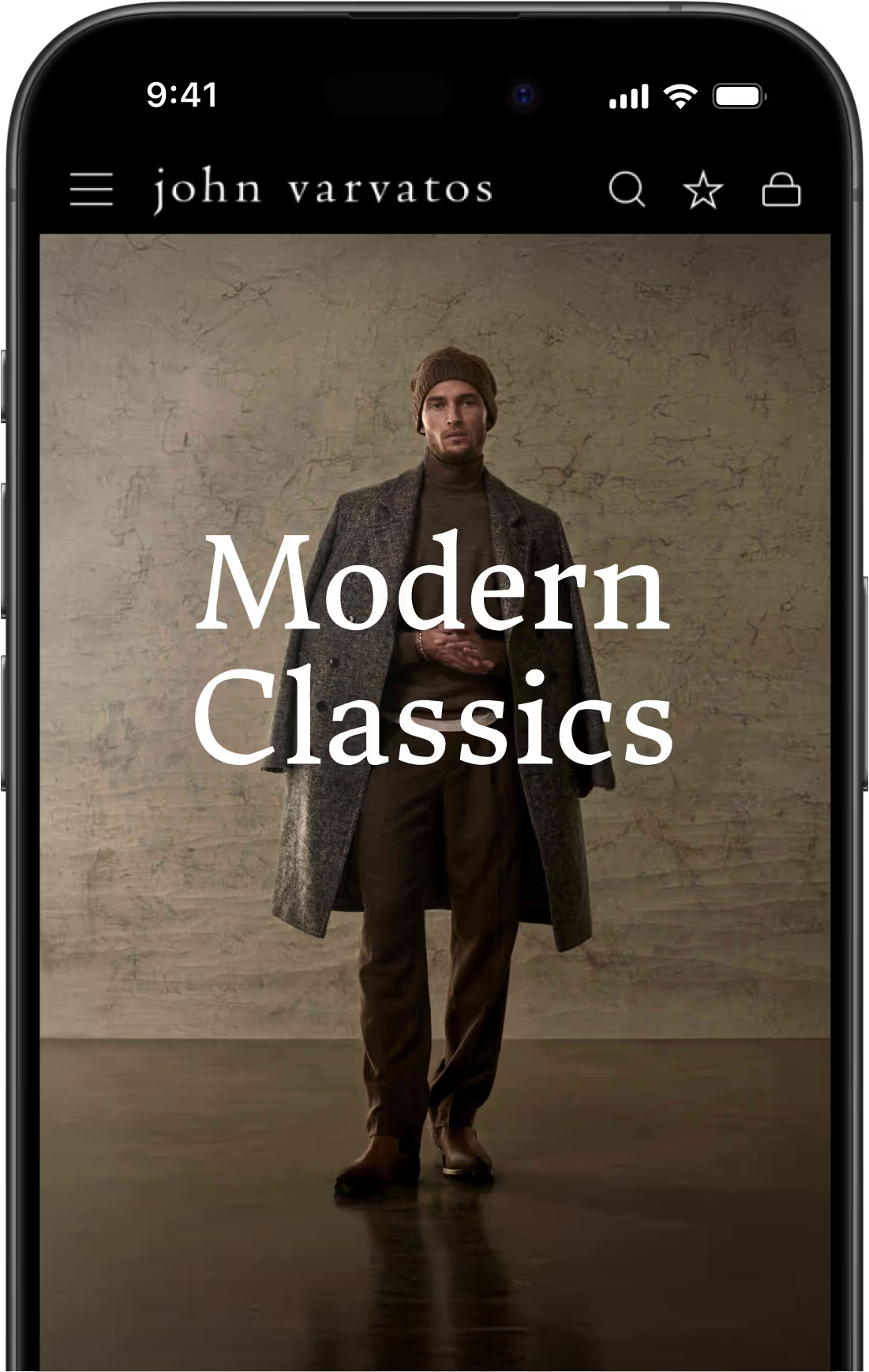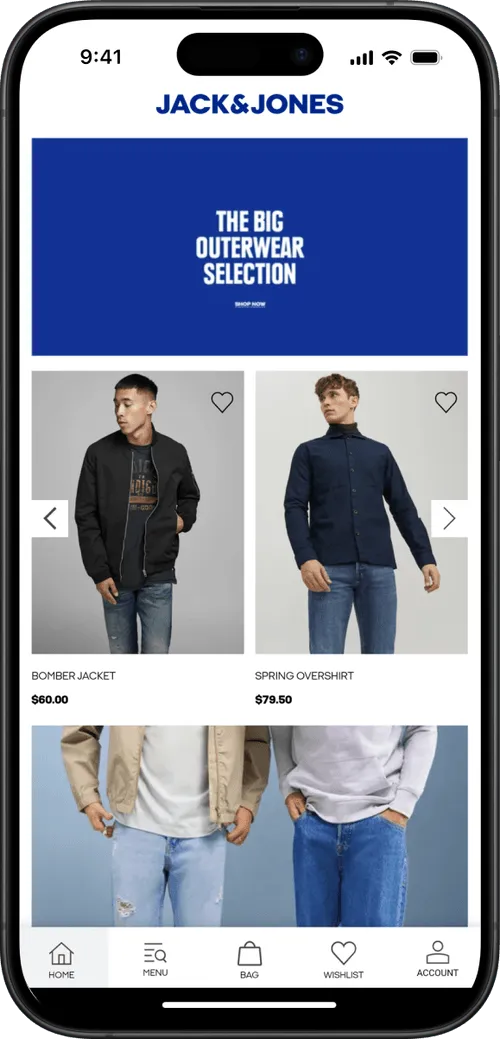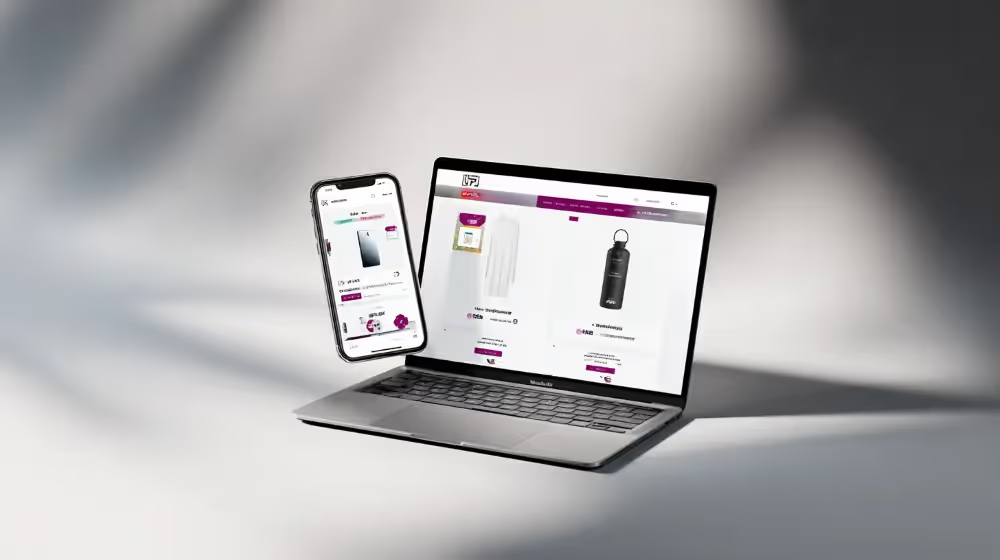The 6 Best B2B Mobile App Builders in 2026
- B2B mobile app builders are a fast, affordable and convenient alternative to custom app development.
- If you're building an app from scratch, DIY tools like GoodBarber, Glide and Appy Pie are worth a look.
- Tapcart and Plobal Apps offer DIY solutions for B2B Shopify stores.
- MobiLoud is the best solution for any B2B business with an existing website, as it allows you to seamlessly convert your site into an app for minimal investment and maximum return.
- B2B mobile app builders are a fast, affordable and convenient alternative to custom app development.
- If you're building an app from scratch, DIY tools like GoodBarber, Glide and Appy Pie are worth a look.
- Tapcart and Plobal Apps offer DIY solutions for B2B Shopify stores.
- MobiLoud is the best solution for any B2B business with an existing website, as it allows you to seamlessly convert your site into an app for minimal investment and maximum return.
There are a ton of benefits for B2B brands to launch their own mobile apps, and B2B mobile app builders make this choice easy.
Instead of:
- Spending hundreds of thousands of dollars on a custom app,
- Waiting six months to a year to see your app go live,
- Then struggling to make enough from your app to make back your initial investment;
You can go live for a low cost, in a short space of time, and immediately see the impact an app has on your business.
There are many choices available in the B2B app builder market today, but not all suitable for your business.
We’ve helped narrow the options down, and provided this list of the best B2B mobile app builders available today.
So if you want to build a powerful asset for your brand, and start generating more engagement and significantly higher retention from your existing audience, read on, and we’ll show you the tools to help you do it.
6 B2B Mobile App Builders to Consider in 2026
Our list of B2B mobile app builders covers a wide range of use cases, from simple B2B apps to complex enterprise apps.
Whatever you need, your ideal solution will be one of these nine tools:
- MobiLoud
- Plobal Apps
- Tapcart
- Appy Pie
- GoodBarber
- Glide
Read on and learn the best B2B mobile app builder for your project.
1. MobiLoud
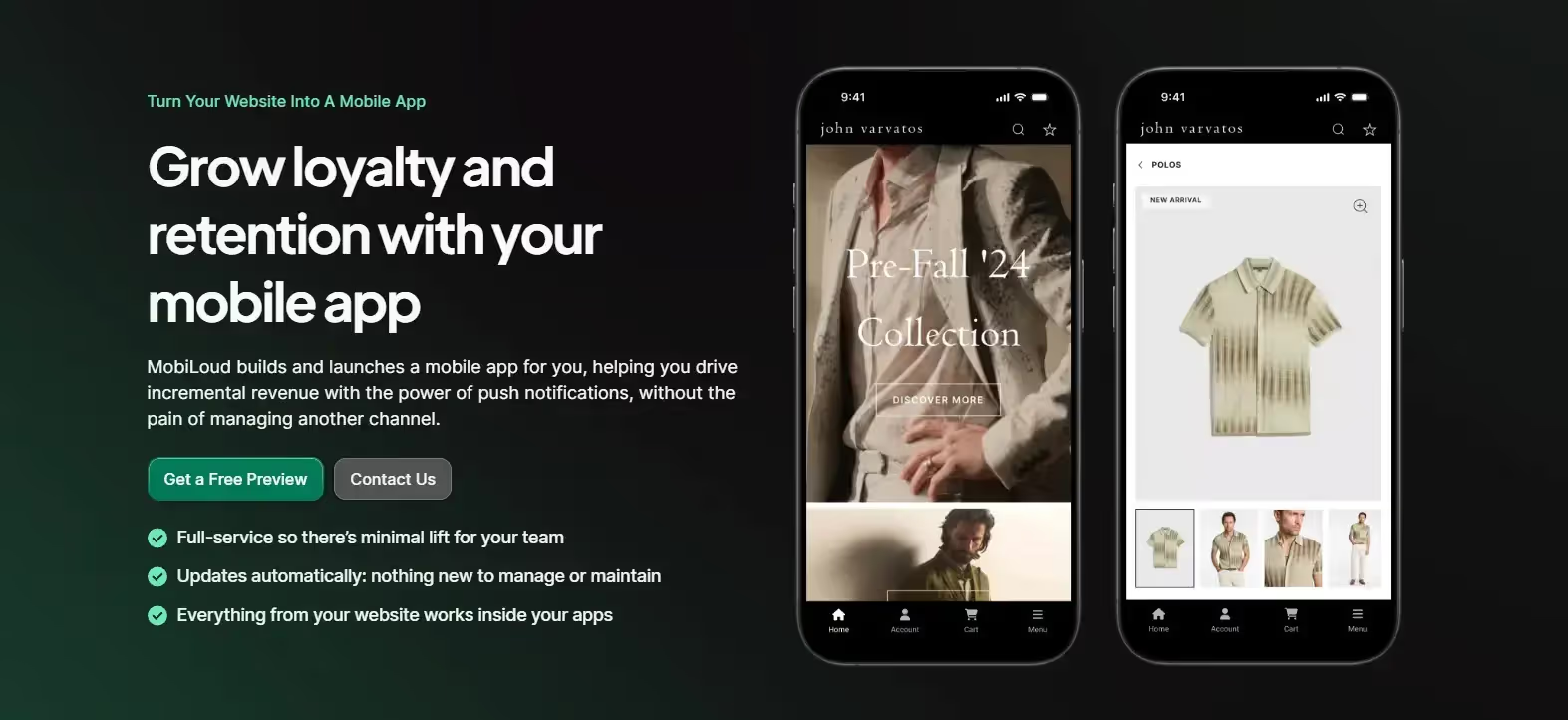
MobiLoud is our service that helps you turn any website into a native mobile app without coding.
We convert everything on your website into a fast, full-featured mobile app that can be published to the app stores, downloaded to your users’ devices, and reach users with push notifications.
You get native apps for a small percentage of the cost of native development, shipped in under a month, with little to no overhead.
You don’t need to manage or update your apps separately, as the apps update whenever you update your website. Both platforms are completely synchronized.
MobiLoud is perfect for any B2B businesses who want to offer the same thing they do on their website, but in the convenience of a mobile app.
Just by allowing your users to launch your app from an icon on their home screen, plus push notifications to generate engagement and keep customers in the loop, you can significantly increase usage and retention, without making wholesale changes to your business model.
We offer managed service, which means you don’t need to do anything – just wait for your app to be done, let your customers know about it, and reap the benefits.
Pros
- No coding required.
- Works with your existing website and shares code.
- Compatible with any web platform, payment platform, plugin or integration.
- Includes full support and maintenance.
- Maintains consistency across your website and mobile app.
- Comes with unlimited push notifications.
- Clear, transparent pricing.
Cons
- Requires a working website to start from.
- Difficult to integrate with some native device features.
Want to learn more about how MobiLoud lets you build the perfect B2B app? Book a demo now and get an overview of the platform, and a walkthrough of how we’ll bring your app to life.
2. Plobal Apps
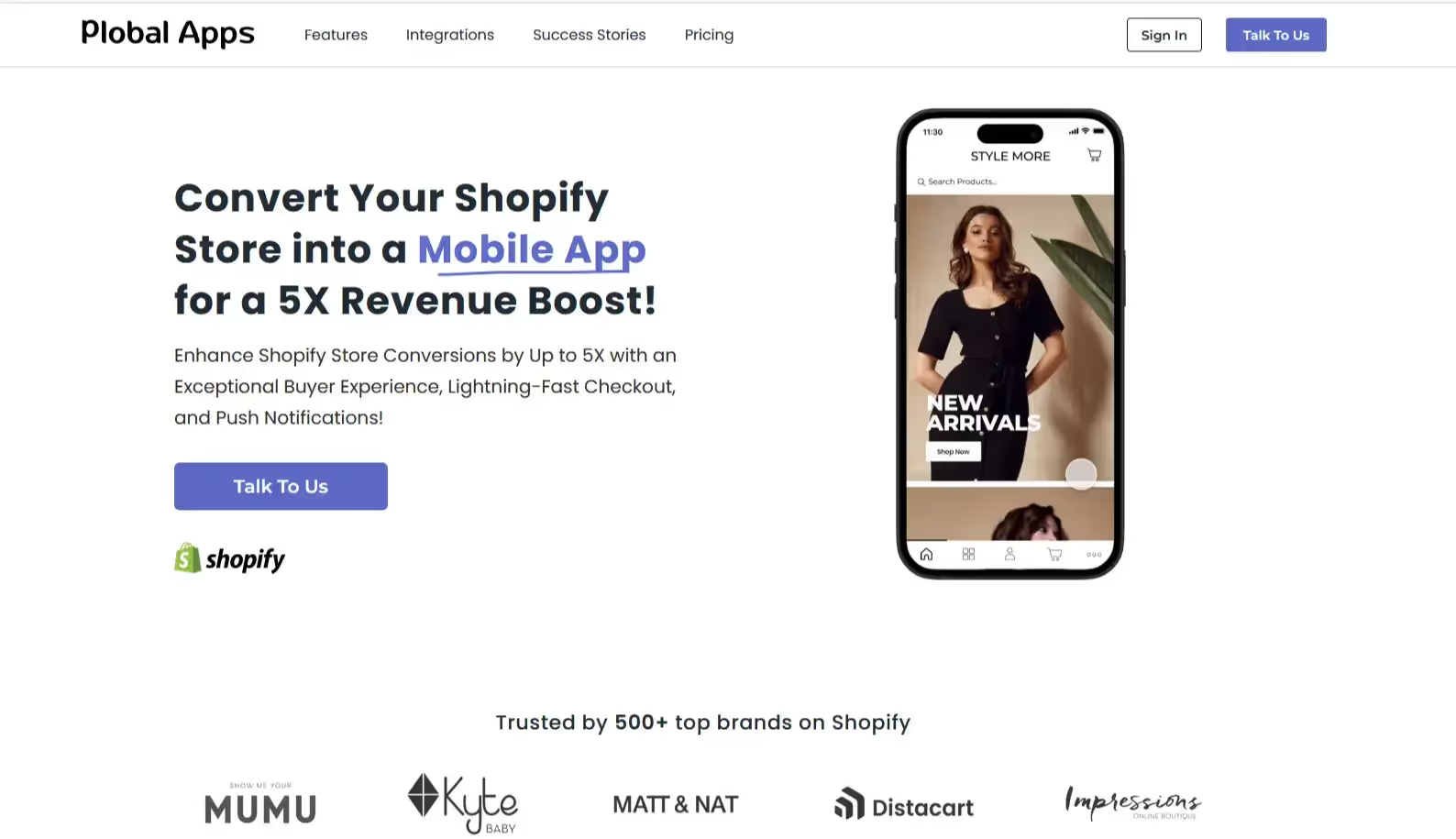
Plobal Apps is a Shopify app builder, which allows you to build no-code apps that integrate with your Shopify store.
It’s a good fit for B2B eCommerce brands wanting to expand into mobile apps, and who want a no-code, DIY experience to build their app.
Plobal is a stable, dependable platform that's easy to use and comes with all the standard features you need in a mobile app (such as push notifications).
There are limits that come with a DIY app builder like this, and Plobal Apps does limit the number of integrations with third-party apps and tools on lower plans.
Still, for a DIY experience, it’s well worth consideration.
Pros
- Shopify API integration.
- No coding needed.
- Push notifications enabled on all plans.
- Simple, easy to use.
Cons
- Only works with Shopify.
- Pricing gets expensive on higher tiers.
- Difficult to fully recreate your web experience in the app.
3. Tapcart
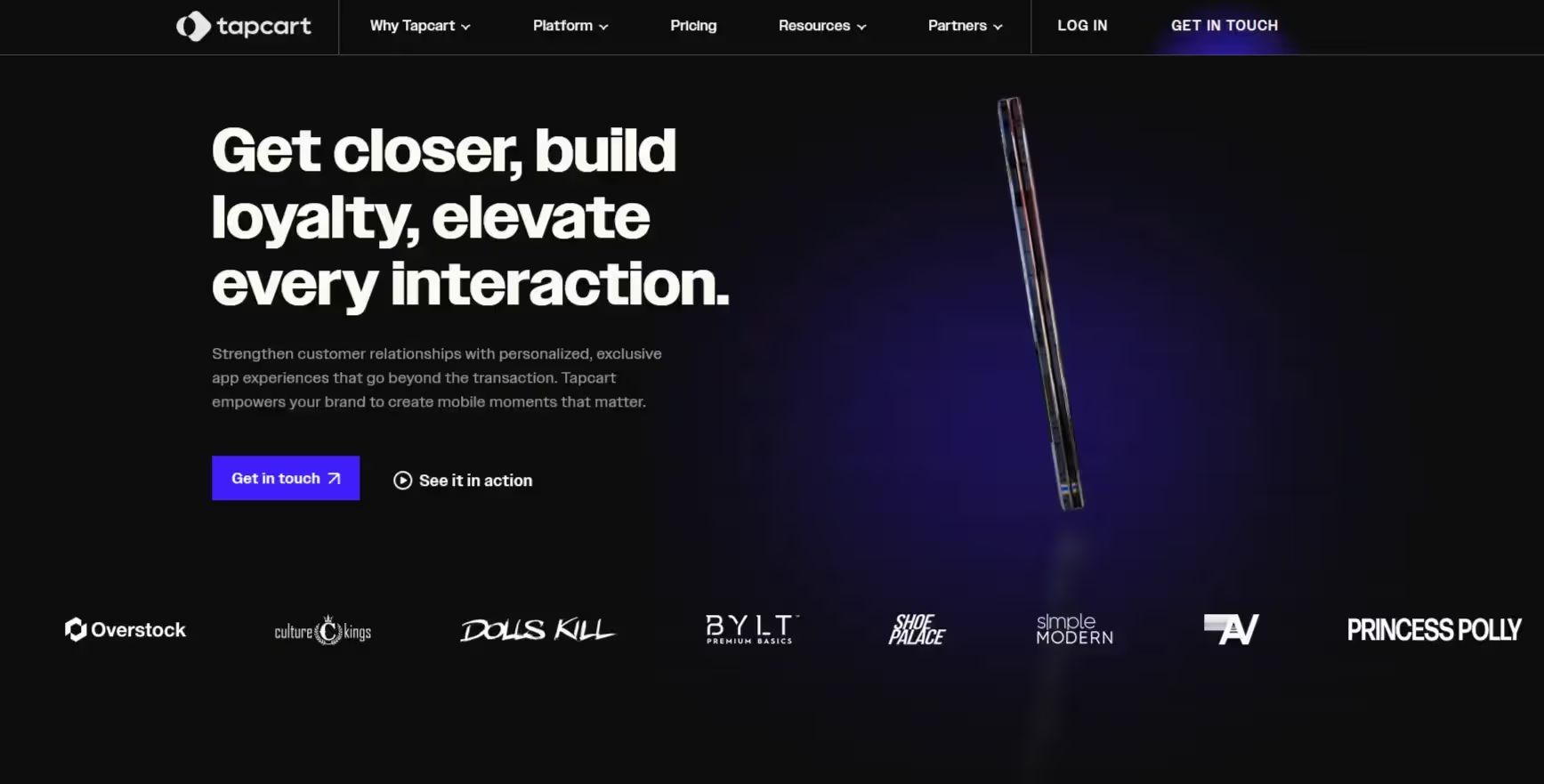
Tapcart is another Shopify app builder, and again a solid choice for building B2B eCommerce apps.
It works much like Plobal Apps. You’ll integrate it with your Shopify store via the Shopify API, compile your app using pre-built blocks, templates and integrations, and then publish it, all without writing a line of code.
Tapcart is more sophisticated than Plobal Apps, and used by more major brands. Yet it is more work to build and manage your app, and with plans that scale based on your revenue, it ends up more expensive.
Tapcart also shares the common issues of DIY app builders, in that it’s difficult to fully recreate your web experience, and adds extra work to your plate, now you need to manage the app as a separate platform (although the backend is connected to your Shopify store).
If your business is on Shopify and you want to build an app for your B2B eCommerce customers, take a look at Tapcart and Plobal Apps (or MobiLoud for a simple, more flexible, managed solution).
Pros
- Shopify API integration.
- Intuitive no-code drag-and-drop builder.
- Powerful feature set.
Cons
- Shopify only.
- Limits to what you can do with the API.
- Expensive.
- More work to build and manage.
4. Appy Pie

Appy Pie is a DIY, no-code app builder that allows you to build apps from scratch, fast.
It’s very beginner-friendly, and gives you all the tools to launch an app in just a matter of days, or even hours.
This expedited pace does come with constraints, and if you want to build a sophisticated mobile app, Appy Pie won’t be suitable.
But for straightforward projects that don’t require any complex features, Appy Pie is a cheap and convenient way to launch your app.
Pros
- Simple DIY builder with no coding needed.
- Affordable, easy to use.
Cons
- Not as sophisticated as other app builders.
- Limits on downloads and push notifications.
- Comes with Appy Pie branding attached.
5. GoodBarber

GoodBarber has been around since 2011, as one of the pre-eminent no-code app builders on the market.
It fits the bill for many B2B businesses, including B2B eCommerce brands, who can use GoodBarber’s eCommerce platform to quickly and easily create an app and start handling orders.
With their eCommerce app builder you can add subscriptions, one-click checkout, push notifications, and more.
The backend lets you handle shipping, taxes, and other logistics. That's especially ideal if you are a brick-and-mortar business and want to venture into eCommerce.
Pros
- No coding required.
- Drag-and-drop interface.
- Can build mobile applications from the ground up.
Cons
- Difficult to integrate your app with an existing website.
- Lacking some high-level features.
6. Glide
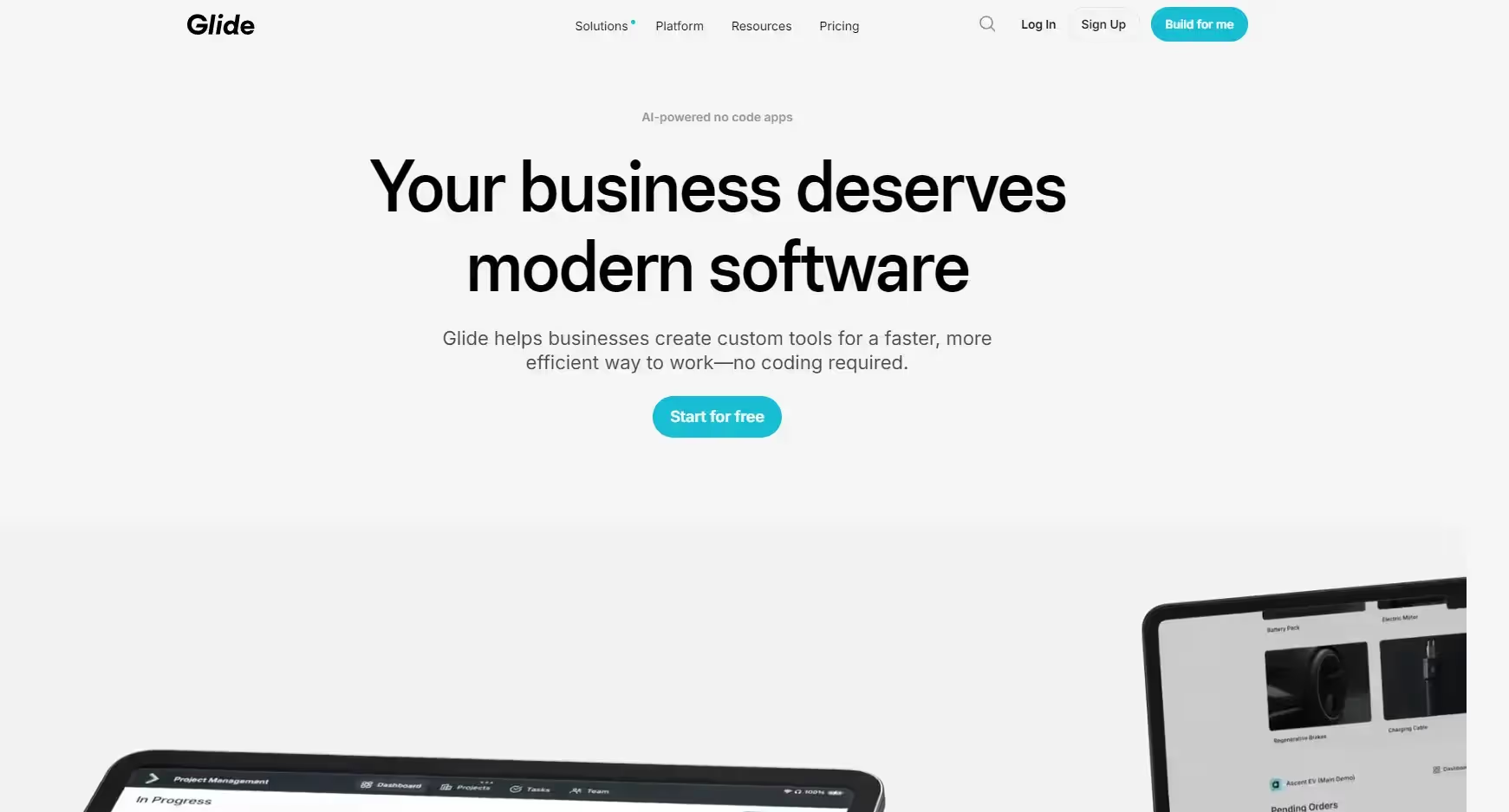
Glide is one of the world’s most popular no-code app builders, and a popular way for B2B businesses to build apps without coding.
You’ll use their drag-and-drop tools (as well as pre-built templates) to compile your app’s UI, then connect your data source of choice to fill the backend (such as Google Sheets, Airtable, Excel, or 100+ other sources on their Enterprise plan).
Glide is powerful and widely used, with more than 100,000 businesses using the platform.
One caveat, though, is that it doesn’t publish fully native apps.
Your app will be a PWA, meaning it’s accessible through the browser, and delivers an app-like experience, but can’t actually be downloaded to users’ devices.
So if you want something that can be published in the app stores, or to harness push notifications to drive engagement, Glide is not the platform for you.
Pros
- Powerful, highly regarded in the industry.
- Pre-built templates to build apps quickly.
- Great fit for internal company apps.
Cons
- Does not support native mobile apps (only PWA).
- Connecting with many data sources requires their enterprise plan.
- Pricing gets expensive for higher tiers.
What to Look For When Choosing a B2B Mobile App Builder
Here are a few things that are important to consider when choosing a mobile app builder for your B2B store.
Building with no code
Coding a mobile app comes with a huge amount of hassle and cost. Spending the money and time on coding a custom app isn’t worth it.
You want a way to build mobile apps without having to write code, enabling you to get your mobile app up and running fast, without a considerable expense.
Shared code base
You want a B2B mobile app builder that lets your website and mobile apps share the same code base.
If the app builder leaves you with two separate code bases to manage, you'll have twice as much work on your plate to maintain and update both platforms.
That just adds expense and hassle that you don't need. Pick a solution that allows you to publish and update content once, and push updates to all your platforms simultaneously.
Support during the app development process
Even with platforms that don't require any coding, building an app that looks nice and functions well can be fiddly and time-consuming.
Ideally, you want a B2B app builder that provides support or even full service in setting up and launching your app. This will let you keep your focus on your regular business processes, and not waste too much time trying to figure out how to create a half-decent app.
Post-launch support
You need a platform that's ready to help at the drop of a hat if anything goes wrong.
Customer satisfaction is vital for your business. With high-LTV business customers, you can't entertain the risk of losing even one customer because something in the app breaks or you have extended downtime.
Find an app builder or a similar solution that provides fast, reliable support once your app is live, to help you preserve customer relationships and customer loyalty by keeping your app fast and bug-free.
Integration with your existing platform and features
You need an app builder that works with the web platform your business uses, and is able to integrate all the key features of your website in the app.
Some app builders only work with specific platforms. If the builder you're looking at doesn't work with your website, you can rule it out completely.
Similarly, if you have custom features on your website that are essential for your sales process, you'll need these to work in your app as well. Some app builders won't be able to do this.
Business to business features
B2B businesses have unique needs, which your app builder should be able to work with.
Push notifications are a must, to maintain regular touchpoints with your customers and make it easy for them to make reorder when needed.
Your app will likely need to protect sensitive business data, which your app builder should support.
It should also provide a personalized experience for your users. Your customers want to be able to make orders quick - make sure the app is able to provide a smooth process for them.
Best B2B App Builders: Final Thoughts
Mobile is fast becoming the most popular way to shop online. And for B2B customers, who are consistently on the go and pride speed and convenience more than anything, having your own mobile app can significantly increase customer loyalty and enhance business growth.
Your business strategy has to include a focus on mobile, and mobile apps are the best way to do this.
There are plenty of options out there when it comes to building your mobile app, but none are as capable and efficient as MobiLoud.
MobiLoud gives you everything you need to create your app, right out of the box, seamlessly integrating with your existing website—no coding required.
Schedule a free, personalized demo and see how MobiLoud empowers businesses to build high-quality native apps with minimal time, cost, and overhead.
FAQs
Convert your website into a mobile app




